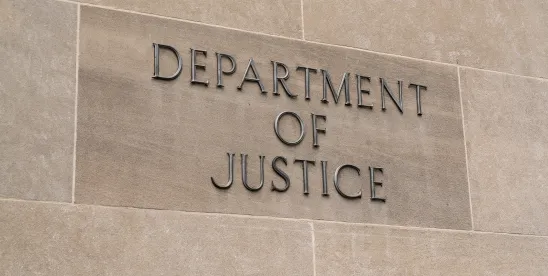On May 22, 2024, the Department of Justice (DOJ) announced the first-ever declination under the National Security Division’s recently updated Enforcement Policy for Business Organizations (NSD Policy). The NSD Policy offers corporate entities a presumption of a non-prosecution agreement (NPA) when they voluntarily self-disclose to the National Security Division (NSD) potential criminal conduct, fully cooperate, and timely and appropriately remediate the misconduct. Here, the DOJ declined to prosecute Sigma-Aldrich, Inc., d/b/a MilliporeSigma for violations of the Arms Export Control Act, the Export Control Reform Act, 13 U.S.C. § 405, and 18 U.S.C. § 554 arising from a MilliporeSigma employee’s participation in the diversion of its biochemical products.
Background
During approximately six years, until May 2023, Pen Yu fraudulently ordered biochemical products from MilliporeSigma with the assistance of MilliporeSigma salesperson Gregory Munoz, who, in exchange for thousands of dollars of gift cards, falsely identified Yu as a lab researcher at an academic institution. Using Munoz’s imprimatur, Yu ordered millions of dollars of products for delivery to the academic institution, where a university employee diverted them to Yu. Yu repackaged and sent the products, which MilliporeSigma determined were subject to export controls, including the International Traffic in Arms Regulations and the Export Administration Regulations, to China. Yu falsified the value and contents of these exports on shipping documents submitted to the U.S. government.
MilliporeSigma compliance personnel identified some of these transactions as suspicious. MilliporeSigma retained counsel to investigate. Within a week before the investigation concluded, MilliporeSigma made an initial disclosure to the NSD. Thereafter, MilliporeSigma fully cooperated by, among other things, identifying relevant documents for the NSD. This cooperation expedited the NSD’s investigation and assisted in securing guilty pleas by Yu and Munoz.
Based on these facts, the DOJ granted MilliporeSigma the extraordinary relief of a declination. The declination letter is available here, and the related press release is available here.
Rationale for the Declination Instead of the Presumptive NPA
The DOJ cited several factors for granting MilliporeSigma a more favorable outcome—a declination—instead of the presumptive NPA under the NSD Policy.
- MilliporeSigma timely and voluntarily disclosed the misconduct. The NSD Policy requires disclosure “‘within a reasonably prompt time after becoming aware’” of misconduct. The DOJ highlighted that MilliporeSigma made the self-disclosure within a week of discovery and before all the facts were known.
- MilliporeSigma proactively cooperated by disclosing all relevant facts about the misconduct and the involved persons and identified evidence to permit search warrants. MilliporeSigma also agreed to ongoing cooperation in the declination letter.
- The nature and seriousness of the offenses were limited. The biochemical products did not pose a significant threat to national security and did not require export licenses in most instances.
- MilliporeSigma undertook timely remediation, including termination of the employment contract of the involved salesperson and enhancement of internal controls.
- MilliporeSigma was a victim because it gave discounts to Yu based on the conspirators’ fraud. Although it profited from the misconduct, the intent of Yu’s scheme was not to benefit MilliporeSigma. In that context, the DOJ determined that it would not require MilliporeSigma to pay disgorgement, forfeiture, or restitution.
Key Takeaways
This first-of-its-kind resolution under the NSD Policy can be instructive for companies and their counsel seeking a presumptive or more favorable outcome from a voluntary self-disclosure to the NSD.
- The DOJ and NSD are committed to their voluntary self-disclosure programs.
- Under the right circumstances, the NSD is willing to offer an outcome—a declination—more favorable than the presumption under the NSD Policy—an NPA. Counsel should be prepared to make their best arguments based on the record that they themselves may have helped develop through investigation.
- MilliporeSigma identified the relevant misconduct through the work of its own compliance function in identifying red flags in some of the transactions. In other words, MilliporeSigma was proactive rather than reactive, such as in response to a whistleblower report. Investment in an effective compliance program and internal audit can generate real risk mitigation and have practical benefits should illegal conduct occur.
- The NSD specifically identified timeliness—disclosure within a week of discovery and before counsel concluded its investigation—as a driver of the decision to decline prosecution. Although counsel and their clients are hesitant to disclose to the government without complete knowledge, so that clients’ exposures can be fully assessed, the government may require preliminary disclosure to receive the most favorable resolutions.
- A company may be able to avoid financial obligations from a self-disclosure, such as disgorgement, forfeiture, or restitution, when it can demonstrate that the benefits it may have received from a scheme were not purposeful, that is, that they were collateral to the individuals’ misconduct.




 />i
/>i

